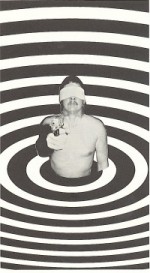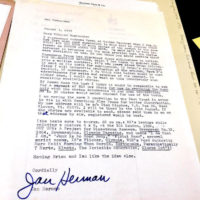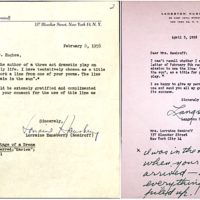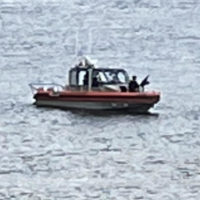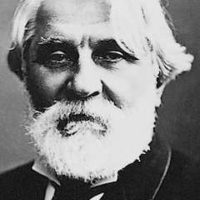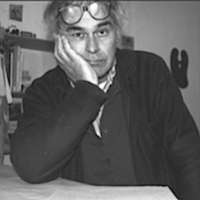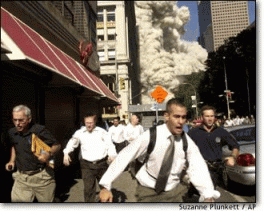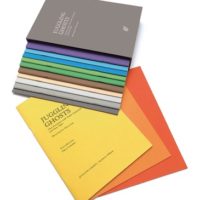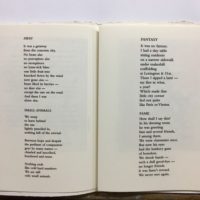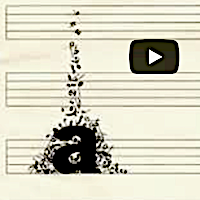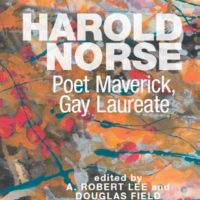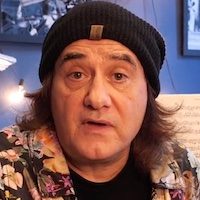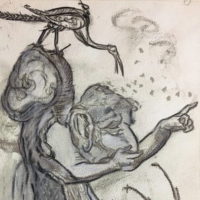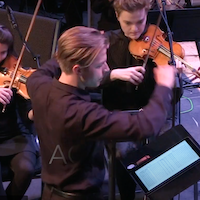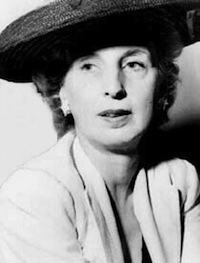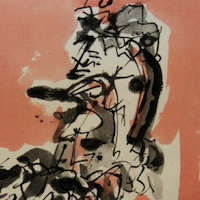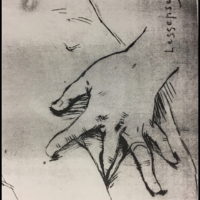Norman Ogue Mustill (1931-2013) was an American artist, who primarily used collage as his medium. He was born in Montreal, Canada and was educated at the Montreal Museum of Art and Ecole Des Beaux Artes. During the 1950s, Mustill lived in New York (New York), Los Angeles (California), and Mexico City (Mexico). He moved to San Francisco (California) in 1960, which led to collaboration with filmmakers, painters, and poets of the beat generation. Mustill was not interested in being a public figure and avoided the art world. He adopted the middle name “Ogue,” which he took from the fashion magazine Vogue to protest the fashionable.” — Stuart A. Rose Manuscript, Archives, and Rare Book Library
Mining the Archives
‘Un-American Express’ — It Never Happened
Speaking of literary archives, you never know what will turn up. This letter from a half-century ago, for instance: It was discovered the other day at Emory University about two literary projects, one of which came to fruition, while the other never did.
Beinecke’s Sweet Tweet
Lorraine Hansberry to Langston Hughes and His Reply
An eagle-eyed member of Straight Up’s staff of thousands, unpaid but indefatigable, noticed this exchange posted on Twitter by the Beinecke Rare Books and Manuscript Library at Yale University, and sent it along. Perhaps you saw it? If not . . .
A World of Trouble
Cityscape East River NYC (9-20-2021)
A pair of NYPD patrol boats were stationed in the East River at the approach to the 59th Street Bridge. Each was fitted out with a manned, high-caliber machine gun. There was no boat traffic as there usually is — no barges going upriver, no tug boats churning heavy wakes behind them, no sail boats moving lazily with the current, no speedboats — all apparently prohibited due to the opening session of the U.N. located nearby on the Manhattan bank of the river. Many streets in the surrounding neighborthood were cordoned corral-style into single-file walk lanes. Cops were everywhere, and life was calm and complacent and inconvenient in a world of trouble.
Ivan Turgenev on Aging
‘He Did Not Picture Life’s Sea as the Poets Depict It’
“He fell to thinking . . . slowly, listlessly, wrathfully. He thought of the vanity, the uselessness, the vulgar falsity of all things human. All the stages of man’s life passed in order before his mental gaze (he had himself lately reached his fifty-second year), and not one found grace in his eyes.” — Ivan Turgenev, from THE TORRENTS OF SPRING
Moloko to Publish Dutch Mordant
“All drawing from the imagination I’d consider a form of automatic drawing; if it exists, it will exist only for the first time. … I think [my images] arise from the instinctive tendency to not look for semblances or analogies. Meaning, to find all that happens in spite of me—imagination versus verisimilitude. One forever seems to be looking for a dimension not directly visible and through the technique at one’s disposal express the sensation that evokes.” — Gerard Bellaart
Remembering 9/11
Starting when the news broke, my report grew longer by the minute. It ran, updated in real time, as MSNBC.com’s cover story. I cobbled together eye-witness accounts — my own, those of others from MSNBC and the Associated Press — writing and rewriting as the catastrophe mounted. Twenty years later I’d rather not reprise all the horrors.
Heathcote Williams’s Credo
‘If Poetry Isn’t Revolutionary, It’s Nothing’
This is a collectors alert. Open Head Press is about to release “Juggling Ghosts”, a series of pamphlets of previously published poems and essays by Heathcote Williams in a slipcased, numbered edition of 500 copies about his encounters — live and otherwise — with William Burroughs, Harold Pinter, Dylan Thomas, Sinclair Beiles, Christopher Marlowe, Lord Buckley, Christopher Smart, Percy Bysshe Shelley, Michael Lesser, Alan Turing, Diogenes of Synope, William Blake and the Tigers of Wrath.
Making a Chapbook of Poems and Drawings
A high-speed look at the dummy shows the pages in sequence. See the spreads on Barcham Green paper ready for sewn binding.
Mustill’s ‘Critic’ in Motion
Norman O. Mustill made “Critic” on paper, in 1971. He didn’t put much trust in critics. The musical symbols cascade down the page, the letter decays beneath them, and they all disappear into nothingness. I take it as satirical comment.
Essays in the Works About That ‘Bastard Angel’
The late poet Harold Norse, né Rosen, was a born maverick. His splendid Memoirs of a Bastard Angel is a delicious account of his life and involvement with too many literary legends to name. But what the hell, here goes: William Carlos Williams and W.H. Auden, Tennessee Williams and James Baldwin, Robert Graves and Paul Bowles, Anaïs Nin and Dylan Thomas, William S. Burroughs and Charles Bukowski. I’ll stop there. Now Clemson University Press is planning to bring out a collection of personal and scholarly essays about his poetry and his life, edited by A. Robert Lee and Douglas Field.
Keith Patchel, R.I.P.
Keith Patchel, an American composer and musician, has died. He was 65. One of his musical legacies is the chamber opera “The Plain of Jars,” about America’s secret war in Laos. Anthony Haden Guest called it “the lineal descendant of Stravinsky’s ‘Nightingale’ and Alban Berg’s ‘Lulu’ and ‘Wozzeck.'” His “Pluto Symphony,” created for the Hayden Planetarium, was nominated for the 2015 Pulitzer Prize.
Bloggers, Poets, Writers . . .
“Words cascade like an avalanche in spring. Try chewing your pencil and staring out the window in despair every so often.” — Wislawa Szymborska
‘Ode to Idealism’
A Contemporaneous ‘Day of Imagination’ in Brooklyn
Contemporaneous, an ensemble of some two dozen musicians, started out at Bard College as the brainchild of a pair of undergrads. Now, more than a decade later, the ensemble is based in New York City and continues to thrive professionally. It will present its largest production to date on Sept. 18. Billed as The Day of Imagination, the program at the Irondale Center in Brooklyn will feature three sets over a full day, four world premieres, six hours of music, and 50 artists.
Out of the Past
Journalism as the Poetry of Fact
Kay Boyle regarded journalism, when it was written well about something important, as “the poetry of fact.”
‘Runaway’: New Folio from Cold Turkey Press
Great beauty from great despair unbends the mind. In a pointless hostile universe that is every poet’s goal.
Here and Now
The morning light takes its time
coming through the bedroom window.
It wakes me properly in the here and now.

